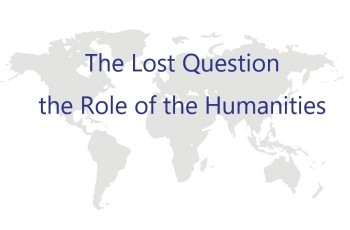シンクタンクからの眼 2021年2月26日
人文学の役割(1)失われた問い The Lost Question and the Role of the Humanities

人文学の役割(1)失われた問い The Lost Question and the Role of the Humanities
近代化は人間の生活に大きな変化をもたらした革命的な過程でありました。産業と科学技術の発展は、人類に物質的な豊かさと利便性を提供し、私たちはこれまでのどの時代よりも豊かな世界で生きています。しかし、近代化の輝かしい成果の背後には、私たちが失った大切なものがあると思います。それは人間らしい生き方に関する根本的な問い、すなわち「なぜ?」という哲学的な問いだと思います。
西洋のニュートン物理学に代表される近代科学は、世界を受動的で分析可能な対象として捉えました。すべての存在は、単に空間の中に配置された物体として還元され、創造的なインスピレーションや想像力を刺激する生命力のある存在としては理解されませんでした。そこにアジアの儒教的文化が結びつき、学習者は主体的に思考する存在ではなく、知識を受動的に受け入れる存在として位置付けられました。すなわち、近代化の流れの中で、学校や博物館などはインスピレーションや洞察を得る空間ではなく、過去や西洋という師匠から学ぶための場所へと変貌していきました。重要なのは、私たちの思考の仕方までこうした環境の中で再生産されてきたと思います。
私たちは、哲学的な問いや思索は徐々に姿を消し、「何か?」という科学的な問いには慣れても、「なぜ?」という哲学的な問いには馴染みが薄くなりました。生きる目的や方向を考えるよりも、豊かさに結び付く成長と効率、そしてデーターで表現できる成果を追求することに忙殺されてきました。
「豊かに生きる」とは、単に経済的な豊かさや質的な所有に限定され、真の幸福や人間らしい生き方についての哲学的な考察は後回しにされてきました。その結果、人文学は試験対策の知識やイデオロギー的な対抗手段に縮小され、人間社会にビジョンを提示したり方向性を模索する役割を果たせなくなりました。私たちが本当に何のために生きているのか、生きる目的が何なのかを問う声は次第に小さくなりました。
しかし近年、人文学に対する関心が復活しつつあるように感じています。それは単なるトレンドではなく、人間社会に対する危機感などのなかで方向性を見出そうとする人々の動きであるように思います。物質的な豊かさや効率だけでは満足できない人々が、今や経済的なデーターではなく、人間の価値や生きる意味を再び問い始めていることだと思います。
人文学的な問いとは、結局のところ、人の本質に近づくための一歩一歩であるからです。
人間らしい生き方とは何か?
「豊かに生きる」とは、単に経済的な成功を意味するのか?それともより深い価値を追求する旅路なのか?
このように、人文学とは真の生きることへの道しるべでもあると思います。今の時代において、人文学の役割はこれまで以上に重要であります。
人文学は単に過去を探求する学問ではなく、今までの自己を省察し、未来を照らすための羅針盤であります。経済的な成果や技術的な革新の時代のなかでも、人間とは何か、人間らしい生き方とは何かを問う人文学的な考えは、各々の生きる目的を教えてくれるのです。人文学的な問いは、私たちに生きる哲学と方向を与えてくれるに違いありません。
豊かさへの流れのなかで失われていた「なぜ?」という問いを取り戻すこと、それこそが私たちが真に命の価値を理解し、生きるための第一歩になると思います。人文学は、私たちに「豊かに生きる」とは単に物質的な豊かさを超え、生まれてきた意味と人間としての尊厳を再認識する活学を教えてくれるのです。
(玉川 きょうさい、Ph.D./Prof.)
The Lost Question and the Role of the Humanities
Modernization was a revolutionary process that brought significant changes to human life. The development of industry and scientific technology provided humanity with material prosperity and convenience, allowing us to live in a more abundant world than ever before. However, I believe that behind the remarkable achievements of modernization lies something essential that we have lost: the fundamental questions about living a human life—philosophical questions such as “Why?”.
Modern science, exemplified by Newtonian physics in the West, regarded the world as a passive, analyzable object. All existence was reduced to objects arranged in space, failing to be understood as entities with life force that could inspire creativity and imagination. This was combined with the Confucian traditions of Asia, which positioned learners not as subjects who actively think but as beings who passively receive knowledge.
In the course of modernization, schools, museums, and similar institutions transformed from spaces where inspiration and insights could be gained into places to learn from the past or from the West as a teacher. Particularly, our way of thinking has been reproduced in such environments. In other words, philosophical questions and deep thought gradually disappeared. People became accustomed to asking scientific questions like “What?”but less familiar with the philosophical question of “Why?”. Instead of pondering the purpose or direction of life, society became preoccupied with pursuing growth, efficiency, and measurable outcomes expressed through data. “Living richly” became confined to economic prosperity and material ownership, with philosophical reflections on true happiness or human ways of living relegated to the background.
As a result, the humanities were reduced to tools for test preparation or ideological opposition, failing to fulfill their role of presenting visions for society or exploring its direction. Voices asking why we truly live and what the purpose of life is grew increasingly faint.
However, in recent years, there seems to be a revival of interest in the humanities. This is not merely a trend but a movement among people seeking direction amidst societal crises. Modern society, no longer satisfied with material prosperity and efficiency alone, is now beginning to question human values and the meaning of life, rather than relying solely on economic metrics. Questions posed by the humanities ultimately take us step by step closer to the essence of being human. What does it mean to live a human life? Does “living richly” simply mean achieving economic success, or does it represent a journey in pursuit of deeper values?
The humanities can serve as a compass guiding us toward a meaningful life. In this era, the role of the humanities is more critical than ever. The humanities are not just about exploring the past but about reflecting on ourselves and illuminating the future. Questions from the humanities provide us with the philosophy and direction needed to live. Even in an age of economic achievements and technological innovations, the humanities prompt us to ask fundamental questions: What is a human being? What does it mean to live as a human? These questions offer us a sense of purpose in life.
Reclaiming the question of “Why?”, which was lost in the flow of modernization, is the first step to truly understanding value and living. The humanities teach us that “living richly” goes beyond material wealth—it means reaffirming our dignity and sense of meaning as human beings.
(K.S.Tamagawa, Ph.D./Prof.)




